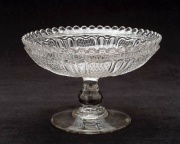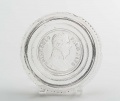Difference between revisions of "Pressed glass"
Jump to navigation
Jump to search
m (Text replace - "\[http:\/\/cameo\.mfa\.org\/materials\/fullrecord\.asp\?name=([^\s]+)\s(.*)\]" to "$2") |
|||
| Line 14: | Line 14: | ||
</gallery> | </gallery> | ||
| + | == Resources and Citations == | ||
| − | + | * ''Encyclopedia Britannica'', http://www.britannica.com Comment: Pressed Glass. Accessed April 29, 2004. | |
| − | |||
| − | * ''Encyclopedia Britannica'', http://www.britannica.com Comment: Pressed Glass. | ||
* Edward Reich, Carlton J. Siegler, ''Consumer Goods: How to Know and Use Them'', American Book Company, New York City, 1937 | * Edward Reich, Carlton J. Siegler, ''Consumer Goods: How to Know and Use Them'', American Book Company, New York City, 1937 | ||
Revision as of 13:58, 25 August 2020
Description
An inexpensive glassware prepared by pressing molten glass into a mold with a plunger. Pressed glass became popular in the 19th century after the development of a glass-pressing machine in 1825 by John P. Bakewell led to mass production. Until the mid 1860s, most pressed glass was made from high-quality Flint glass; after that point, less expensive Soda glass was used.
Synonyms and Related Terms
geperst glas (Ned.); vidro prensado (Port.)
Additional Images
Resources and Citations
- Encyclopedia Britannica, http://www.britannica.com Comment: Pressed Glass. Accessed April 29, 2004.
- Edward Reich, Carlton J. Siegler, Consumer Goods: How to Know and Use Them, American Book Company, New York City, 1937
- Susan E. Schur, Conservation Terminology: A review of Past & Current Nomenclature of Materials, Technology and Conservation, Spring (p.34-39); Summer (p.35-38); Fall (p.25-36), 1985

